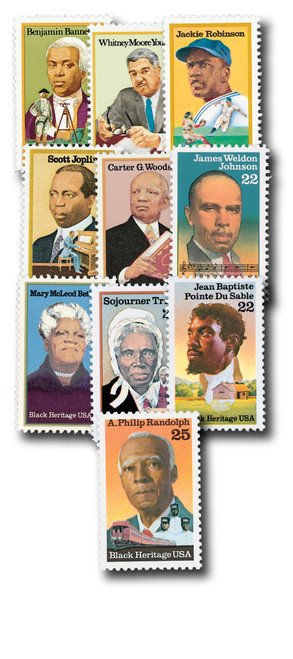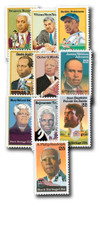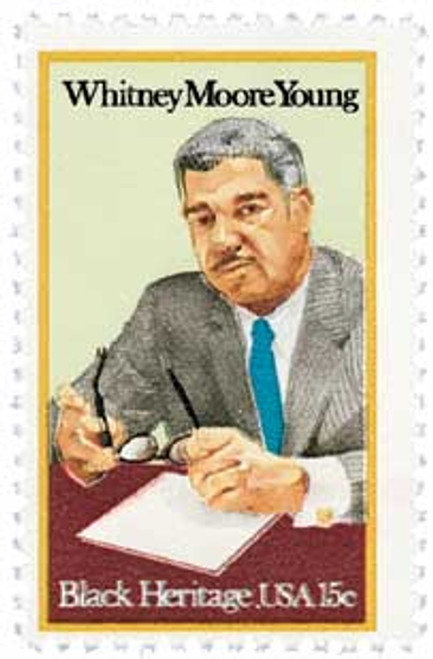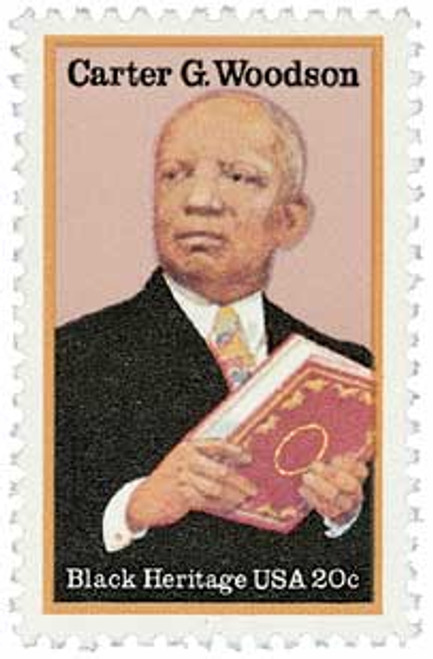
# 1804/2402 - 1980s Black Heritage Collection, 10 stamps
Are You Missing These 1980s Black Heritage Series Stamps?
Introduced in 1978, the Black Heritage Series is one of the USPS’s longest-running and most popular stamp series. This is your chance to own all the Black Heritage stamps issued in the 1980s in one easy, time- and money-saving order. These stamps honor:
Benjamin Banneker was a self-educated mathematician and astronomer who correctly predicted a solar eclipse in 1789. He was also the first black man appointed to a major committee, helping to plan Washington, DC.
Whitney Moore Young served as head of the National Urban League, helping thousands of black Americans get jobs. He started on-the-job training programs and established Head Start and tutoring centers.
Jackie Robinson was the first black person to play modern major league baseball. By breaking the “baseball color line,” Robinson helped bring an end to racial segregation in professional baseball.
The “king of ragtime,” Scott Joplin combined African-American folk music with European music that was popular in the late 19th century to create ragtime. He published his most famous work, “Maple Leaf Rag” in 1895 and has been credited with helping to “revolutionize American music and culture.”
The “Father of Black History,” Carter G. Woodson overcame economic and social barriers to become the person most responsible for researching, writing, and teaching about the heritage of black Americans. In 1926, Woodson pioneered the acknowledgment of the second week in February as “Negro History Week,” which has expanded to become today’s Black History Month.
Mary McLeod Bethune organized the National Council of Negro Women in 1935 and served as an advisor to President Franklin D. Roosevelt as a member of his “Black Cabinet.” Upon Bethune’s death, columnist Louis E. Martin said, “She gave out faith and hope as if they were pills and she some sort of doctor.”
Sojourner Truth was an abolitionist and a women’s rights activist. Moving to New York City after she acquired her freedom, she found it nearly impossible to earn a living. She then began traveling, lecturing, and educating former slaves and was considered one of the greatest orators of her time.
Jean Baptiste Pointe Du Sable is honored as the founder of the city of Chicago. Born in Haiti, Du Sable prospered in Chicago as a general merchant, fur trader, and farmer. His trading post included a 40’x20′ dwelling – a size almost unheard of in the wilderness – 2 barns, a mill, a bakehouse, a poultry house, and large livestock holdings.
James Weldon Johnson was representative of both the intellectual and creative worlds, being an educator, author, diplomat, lawyer, and lyricist. He was the first African-American accepted to the Florida bar, held several public offices, served as the executive secretary of the NAACP, and was a prominent figure in the Harlem Renaissance.
A. Philip Randolph was a respected and outspoken proponent of the rights of minority labor. He was named Vice-President of the AFL-CIO in 1957 and was the founder of both the March on Washington Movement and the Brotherhood of Sleeping Car Porters, which helped organize African-American labor.
Add all this important history to your collection – send for yours now.
Are You Missing These 1980s Black Heritage Series Stamps?
Introduced in 1978, the Black Heritage Series is one of the USPS’s longest-running and most popular stamp series. This is your chance to own all the Black Heritage stamps issued in the 1980s in one easy, time- and money-saving order. These stamps honor:
Benjamin Banneker was a self-educated mathematician and astronomer who correctly predicted a solar eclipse in 1789. He was also the first black man appointed to a major committee, helping to plan Washington, DC.
Whitney Moore Young served as head of the National Urban League, helping thousands of black Americans get jobs. He started on-the-job training programs and established Head Start and tutoring centers.
Jackie Robinson was the first black person to play modern major league baseball. By breaking the “baseball color line,” Robinson helped bring an end to racial segregation in professional baseball.
The “king of ragtime,” Scott Joplin combined African-American folk music with European music that was popular in the late 19th century to create ragtime. He published his most famous work, “Maple Leaf Rag” in 1895 and has been credited with helping to “revolutionize American music and culture.”
The “Father of Black History,” Carter G. Woodson overcame economic and social barriers to become the person most responsible for researching, writing, and teaching about the heritage of black Americans. In 1926, Woodson pioneered the acknowledgment of the second week in February as “Negro History Week,” which has expanded to become today’s Black History Month.
Mary McLeod Bethune organized the National Council of Negro Women in 1935 and served as an advisor to President Franklin D. Roosevelt as a member of his “Black Cabinet.” Upon Bethune’s death, columnist Louis E. Martin said, “She gave out faith and hope as if they were pills and she some sort of doctor.”
Sojourner Truth was an abolitionist and a women’s rights activist. Moving to New York City after she acquired her freedom, she found it nearly impossible to earn a living. She then began traveling, lecturing, and educating former slaves and was considered one of the greatest orators of her time.
Jean Baptiste Pointe Du Sable is honored as the founder of the city of Chicago. Born in Haiti, Du Sable prospered in Chicago as a general merchant, fur trader, and farmer. His trading post included a 40’x20′ dwelling – a size almost unheard of in the wilderness – 2 barns, a mill, a bakehouse, a poultry house, and large livestock holdings.
James Weldon Johnson was representative of both the intellectual and creative worlds, being an educator, author, diplomat, lawyer, and lyricist. He was the first African-American accepted to the Florida bar, held several public offices, served as the executive secretary of the NAACP, and was a prominent figure in the Harlem Renaissance.
A. Philip Randolph was a respected and outspoken proponent of the rights of minority labor. He was named Vice-President of the AFL-CIO in 1957 and was the founder of both the March on Washington Movement and the Brotherhood of Sleeping Car Porters, which helped organize African-American labor.
Add all this important history to your collection – send for yours now.














